 |
Convert EVO to JPG/JPEG Sequence
|
JPG/JPEG is a commonly used method of lossy compression
for digital photography (image). The degree of compression can be adjusted, allowing
a selectable tradeoff between storage size and image quality. JPEG typically achieves
10:1 compression with little perceptible loss in image quality.
EVO to JPG/JPEG Converter Software converts EVO to JPG/JPEG
sequence files. So, you could get every frame image of EVO in
JPG/JPEG format. You can also set output frame rate and JPG/JPEG resolution in
the software. The output JPG/JPEG files look something like the following screen
shot.
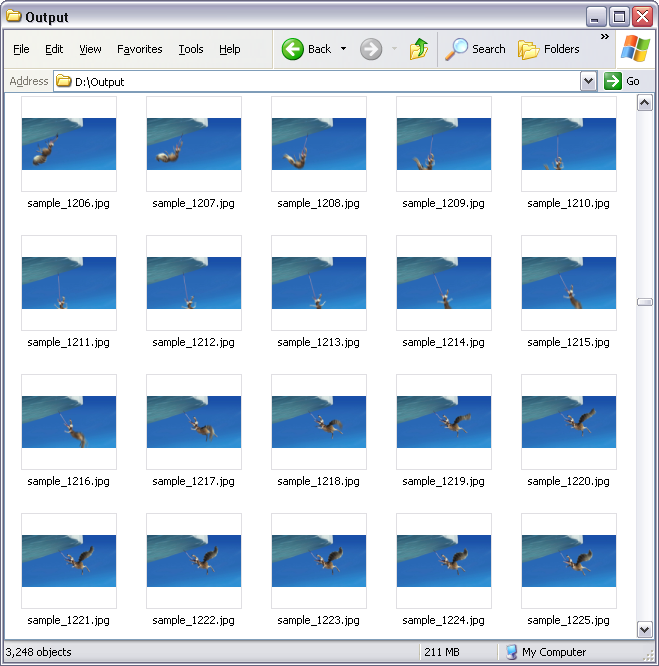
The software also supports other formats and portable devices such as MP2, OGG, AVI, DTS, Windows Phone, MPG, Android Tablet,
etc. The software could convert MOD to FLAC, H263 to DV, H263 to Windows Phone, WebM to SWF, M4V to VOC, and so on.
EVO to JPG/JPEG Software supports batch conversion and, is compatible
with Windows 10/8/7/Vista/XP/2000.

What is EVO?
HD-DVD and BlueRay enhanced VOB file format. The extensions are in the
form of private stream data and their interpretation. The numerical aperture
of the optical pick-up head is 0.65, compared with 0.6 for DVD. All HD
DVD players are backward compatible with DVD and CD. The storage size also
varies: A dual-layer HD DVD holds a maximum of 30 GB of data, while a dual-layer
Blu-ray Disc carries 50 GB. HD DVD-RAM has a single-layer capacity of 20
GB. Like the original DVD format, the data layer of an HD DVD is 0.6 mm
below the surface to physically protect the data layer from damage. There
is also a hybrid HD DVD format which contains both DVD and HD DVD versions
of the same movie on a single disc, providing a smooth transition for the
studios in terms of publishing movies, and allowing consumers with only
DVD players to still use the discs. It is an extension to VOB, which is
an extension to MPEG-2 Program stream. The HD DVD Promotion Group was dissolved
on March 28, 2008. HD DVD competed primarily with Blu-ray Disc. Both formats
were designed as successors to DVD, capable of higher quality video and
audio playback, and of greater capacity when used to store video, audio,
and computer data. Because all variants except 3* DVD and HD REC employed
a blue laser with a shorter wavelength, HD DVD could store about 3.2 times
as much data per layer as its predecessor (maximum capacity: 15 GB per
layer instead of 4.7 GB per layer). Backward compatibility is available
with all HD DVD players, allowing users to have a single player to play
all types of HD DVD, DVD and CD. HD DVD video can be encoded using VC-1,
AVC, or MPEG-2. Blu-ray Disc and HD DVD share most of the same methods
of encoding media onto discs with each other, resulting in equivalent levels
of audio and visual quality, but differ in other aspects such as interactive
capabilities, internet integration, usage control and enforcement, and
in which features were mandatory for players.
What is JPG?
JPEG is an acronym for Joint Photographic Experts Group. JPEG is a standard
of compression for images. It is a "lossy" format, which means
that when the image is compressed, some of the image data becomes lost.
JPEG is ideal for displaying images on the web because it dramatically
reduces the file size of the image without significantly reducing the quality.
Strictly speaking, the JFIF and Exif standards are incompatible because
they each specify that their marker segment (APP0 or APP1, respectively)
appears first. In practice, most JPEG files contain a JFIF marker segment
that precedes the Exif header. This allows older readers to correctly handle
the older format JFIF segment. JPEG/JFIF is mostly used for storing and
transmitting photographs on the World Wide Web, but not as well suited
for line drawings and other textual or iconic graphics because its compression
method performs badly on these types of images. The previous quantized
DC coefficient is used to predict the current quantized DC coefficient.
The difference between the two is encoded rather than the actual value.
The encoding of the 63 quantized AC coefficients does not use such prediction
differencing. JPEG compression artifacts blend well into photographs with
detailed non-uniform textures, allowing higher compression ratios. Notice
how a higher compression ratio first affects the high-frequency textures
in the upper-left corner of the image, and how the contrasting lines become
more fuzzy. The very high compression ratio severely affects the quality
of the image, although the overall colors and image form are still recognizable.
However, the precision of colors suffer less (for a human eye) than the
precision of contours (based on luminance). This justifies the fact that
images should be first transformed in a color model separating the luminance
from the chromatic information, before subsampling the chromatic planes
(which may also use lower quality quantization) in order to preserve the
precision of the luminance plane with more information bits.
How to Convert EVO to JPG/JPEG Sequence?
- Free Download EVO to JPG/JPEG
Converter Software
- Install the Program by Step-by-step Instructions
- Launch EVO to JPG/JPEG Software
- Choose EVO Files

Click "Add Files" to choose EVO files.
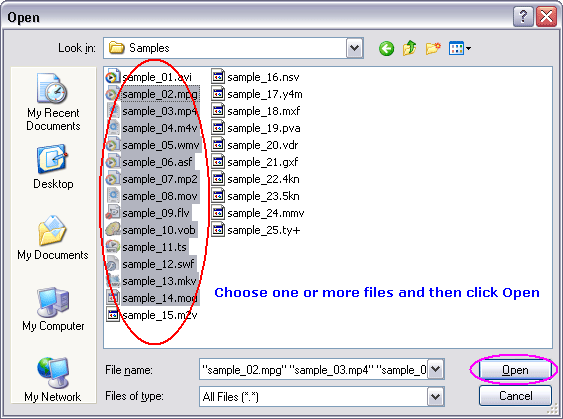
Choose one or more EVO files you want to convert and then click Open.
EVO to JPG/JPEG Software will open EVO files and get file information
of the file such as width, height, frame rate, video bit rate, audio sample rate,
audio bit rate, audio channels, and then display the information of EVO file
at conversion list.
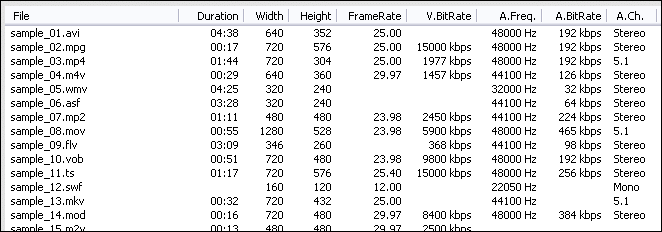
- Choose Output Format
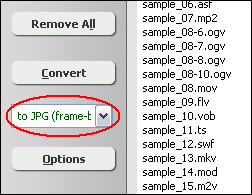
Click on combo-box of output format and then choose "to JPG (image sequence)".
- [Optional, for advanced user]
Set JPG Encoding Parameters
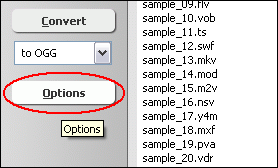
If you want to change JPG encoding parameters such as frame rate, video size,
aspect ratio, and so on, please click "Options".
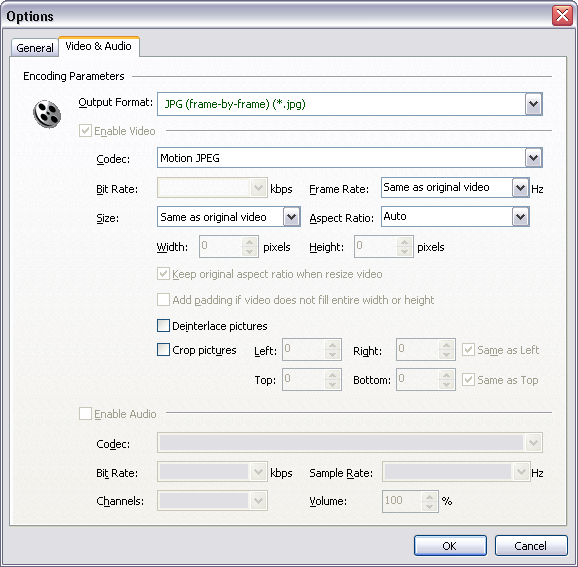
And then, switch to tab "Video & Audio" and choose "JPG
(image sequence)" at "Output Format", and then set options
for image encoding.
- Convert EVO to JPG/JPEG
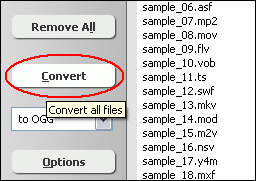
Click "Convert" to convert EVO to JPG/JPEG sequence.

The software is converting EVO files to JPG/JPEG.
- View and Browse JPG/JPEG Files
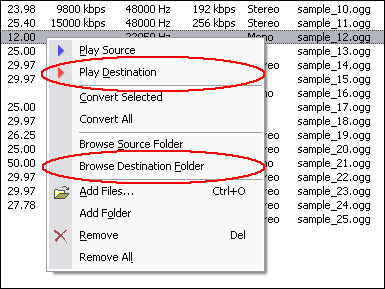
When conversion completes, you can right-click converted item and choose "Play
Destination" to view the first outputted JPG file; or choose "Browse
Destination Folder" to open Windows Explorer to browse the outputted JPG
files.
- Done
Top
EVO to JPG/JPEG Software is 100% clean and safe to
install. It's certified by major download sites.

Convert EVO to JPG/JPEG Related Topics:
|












